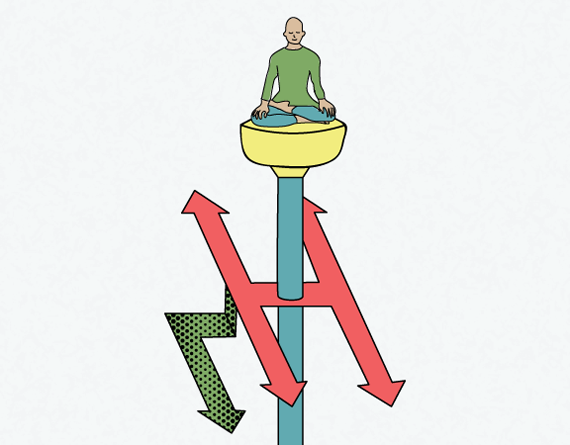In the West, there are many who approach Buddhism primarily intellectually. In the East, many approach it primarily as a tradition—part of their cultural heritage. Yes, Buddhism contains immensely profound and complex intellectual information. Yes, it is an important cultural tradition in many Eastern civilizations. However, Buddhism’s true gift is that it teaches us to learn and experience the true characteristics and the nature of our mind and the world, as they are. Through meditations like those on lovingkindness, compassion, devotion, and wisdom, Buddhism trains us to improve our mind in how we think, communicate, and act with others and the external world. If our mind becomes wholesome, then our vocal and physical activities will become sources of peace and benefit for ourselves and others. This life will be happier, as will the next. Ultimately, through proper meditation, we will be liberated from the suffering of samsara.
No matter how much we study the texts, we need to be mindful of our karma in order to progress. We must stay away from unvirtuous acts and thoughts. But we shouldn’t fritter away our lives by engaging only in neutral karmas. Instead, we should exert ourselves in virtuous karmas such as prayer and service.
Some meditators choose to remain in the absence of awareness. In my experience, these are usually well-educated, high-status achievers. They are often so busy burning both ends of the candle in order to advance their worldly position that they even dream about earning at night. So, understandably, they feel a tremendous sense of relief when someone instructs them, “Just rest in the absence of thoughts.” At last, they can quiet down and let go of their busyness! And since the instruction to do so is given to them by someone whom they consider to be an authority on meditation, they don’t have to feel guilty about slowing down. They are told that doing this is good for their health and mental state. So for these fatigued individuals, having permission to rest without thoughts is new and exciting, something they have rarely tasted.
In reality, however, this meditation experience is a neutral state. Most of these people are simply taking a break while still in the middle of mundane traffic, still in the hub of ordinary karmic and mental habitual settings—without having purified, refined, or transcended their mental and emotional afflictions. So when they come out of that break, that trance, they find themselves back at square one, with the same old mundane dilemmas and habits awaiting them. It is like waking up from a wonderful dream only to find oneself back in reality.
Nevertheless, remaining in neutral thoughts and activities is better than spending one’s life in evil thoughts and deeds, which will cause grave pain. However, spending one’s life in a neutral state is a big waste of the great potential of our most precious human life.
According to Buddhist teachings, the karmic result of remaining in a neutral state, the mere absence of thoughts, is rebirth in the animal, form, or formless realms. We go to the animal realm if our mental habit was ignorance and stupidity. This realm is marked by violence and fear.
We take rebirth in the formless realms if our habitual thought patterns were marked by ideas like “Space is infinite,” “Consciousness is infinite,” “There is nothing,” or “There is no perception and no absence of perception.” Each of these four thought patterns leads to rebirth in a different subdivision of the formless realms, depending on which subdivision best reflects our habits. For instance, having a habit of thinking “Space is infinite” lands us in the subdivision called “infinite space.” In the formless realm, we don’t have gross bodies or forms. We don’t have gross thoughts or emotions. This is due to the past experience of remaining in the absence of thoughts and absence of awareness.
Absorption in the formless realm can last for eons. Eventually, however, it ends. And when it does, we continue from where we left off—returning to our old thoughts and emotions, and experiencing the results of our other positive or negative past karmas. So taking rebirth in the formless realms is a break, a limbo, but with no merits. It is a diversion from the path of liberation, as there is no awakening of the wisdom of intrinsic awareness or discriminative wisdom. That is why Longchen Rabjam laments for those meditators who value remaining in the absence of thoughts:
Alas! These animal-like meditators,
By stopping the perceptions, they remain without
any thought.
Calling this the absolute nature, they become
proud.
If they gain experience in such a state, they will take
rebirth in the animal realm.
Even if they don’t gain much experience in it, they
will take rebirth in the form or formless realms.
They will have no opportunity to get liberation from
samsara.
As long as we make no effort to transform the mind, we cannot escape the ordinary state of grasping tightly at mental objects—dualistically, emotionally, and sensorily. A merely neutral state in which concepts are temporarily suspended won’t help us progress. As soon as we go back to having concepts again, we will return to the ordinary state of grasping we had before. It is like waking up from the escapism of deep sleep, only to find that the same mundane problems await us.
♦
From The Heart of Unconditional Love by Tulku Thondup Rinpoche, ©2015 by Tulku Thondup Rinpoche. Reprinted by arrangement with Shambhala Publications, Inc. Boston, MA.
Thank you for subscribing to Tricycle! As a nonprofit, we depend on readers like you to keep Buddhist teachings and practices widely available.
